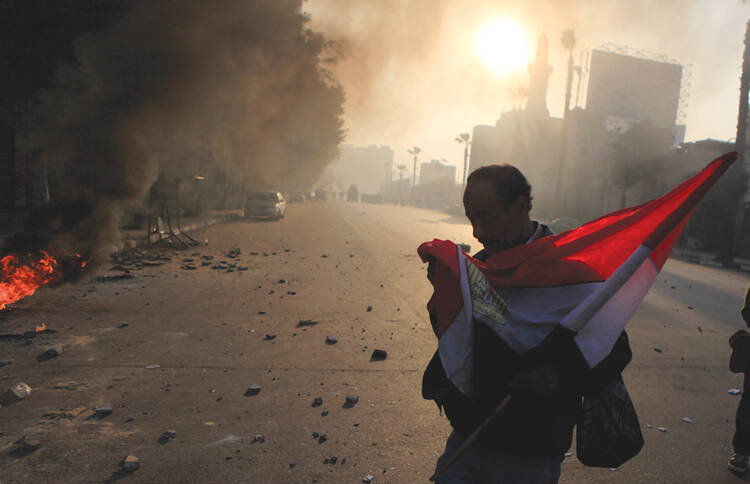A series of bomb attacks rocked Cairo, Egypt, on Jan. 23, the day before the third anniversary of the street revolution in 2011 that toppled the Hosni Mubarak regime. Six people were killed, hundreds were injured, and the city’s police headquarters, strafed and scored in the aftermath of a massive explosion, was badly damaged. Violence continued over the weekend, and 49 people were killed in clashes between pro- and anti-government mobs.
The suicide car bombing of the police building was by far the most serious terrorist attack, a demonstration of the boldness and the reach of those Egyptians willing to pursue a campaign of violence to achieve their political goals.
“These attacks will hit back at those who committed them,” said the Rev. Rafic Greiche, a spokesperson for the Catholic bishops of Egypt. “I am convinced that the violence committed by those who want to throw Egypt into chaos will have an impact against its authors because the Egyptians want peace.” Father Greiche noted that the only demonstrations in the streets of Cairo in the aftermath of the bomb attacks were conducted by Egyptians spontaneously denouncing the Muslim Brotherhood, considered responsible for these and other acts of terrorism. “People are fed up,” he said.
No group claimed responsibility for the bombings, and representatives from the Muslim Brotherhood denied that the organization was involved. The brotherhood has been under increasing pressure since the Egyptian military deposed its candidate, Mohammed Morsi, the only democratically elected president of Egypt, in July last year. Denounced as a terrorist organization by the government that replaced Morsi, the brotherhood was outlawed in September by an Egyptian court.
Despite the latest violence, Egypt’s Christians remain cautiously hopeful about their nation’s future, especially since the approval of a new constitution more amenable to the viability of Egypt’s minority Christian community. Christians make up about 10 percent of the nation’s mostly Sunni Muslim population of more than 85 million.
Moneer Fawzy, a Coptic Christian, has been the target of insults and abuse throughout his life from his Muslim neighbors. A Cairo house painter, Fawzy said anti-Christian speech is often blasted on mosque speakers during Muslim prayer sermons. He voted in favor of Egypt’s new constitution in mid-January because it promised equality for minorities and “laws banning hate speech.”
The new constitution is a heavily amended version of the one adopted in 2012 during Morsi’s brief tenure. Stripped of many of the Islamic-inspired provisions of the Morsi constitution, the new constitution bans the formation of political parties based on religion and makes discrimination and inciting hatred crimes. It also strengthens civilian controls of the country’s military.
The new constitution retains the stipulation that Islamic Shariah law is “the main source” of the country’s legislation, but it adds that all citizens “are equal before the law” and offers more civil liberties to women and to minority groups. The “emphasis on citizenship, and on all citizens having equal rights, is positive for everyone in Egypt, not just Christians,” said the Rev. Kamil William, a Coptic Catholic priest.
Egypt’s election officials reported that nearly 40 percent of registered voters turned out for the constitutional referendum and that more than 98 percent of voters backed the new document. But local and international rights groups say a widespread clampdown on dissent and a mass media campaign urging people to vote for the constitution as the only solution to Egypt’s economic and social woes made it difficult to oppose the amended document openly.








